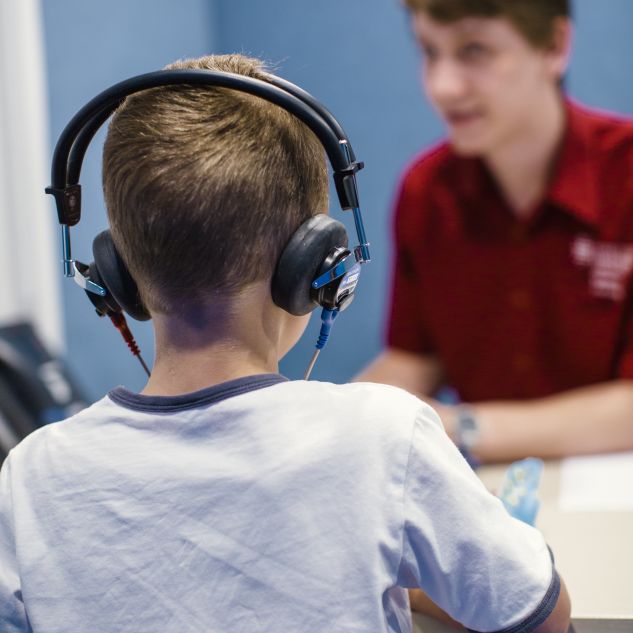
Written By
Hannah Gray
College/Division
College of Healthcare Sciences
Publish Date
20 November 2020
Related Study Areas
A communication toolkit
Communication is a key part of life. Teaching kids how to communicate effectively can support them to not only express themselves but to positively impact the world. JCU Speech Pathology Lecturer, Jacqueline Lim, explains how to give kids the confidence to communicate.
With experience as a speech pathologist and as a lecturer, Jacqui has seen how the ability to communicate can change a child’s life. “If you have the ability to express yourself, you have the ability to reach your full potential,” she says.
Although the title of speech pathologist may suggest that Jacqui’s profession revolves mainly around speaking, Jacqui describes communication as a toolkit rather than a single-use device such as speech.
“It’s important not to limit the idea of communication to just the physical action of talking,” she says. “Being able to express yourself involves both written and verbal modalities, particularly in today’s society where we consistently communicate online through social media and emails and such.”
Depending on where a speech pathologist is placed, they could work with children who have swallowing or feeding difficulties, children who struggle with forming certain letter sounds, or children who have difficulties with speech and language as well as reading and writing. Each of these different types of struggles can limit a child’s ability to communicate.
“We also work with children who have receptive issues,” Jacqui says. “Even if they’re okay with talking, they may have difficulty with listening and understanding. Communication also relies on being able to understand what you’re hearing or reading.”
The evolution of communication
Although we often begin to recognise the value of communication as we mature, Jacqui explains that we learn that value from our very first days on Earth.
“One of the first things that a child begins to realise as they grow is that they can do something to change their environment,” Jacqui says. “That’s one of the fundamental things that children have to learn, cognitively.”
Jacqui says when a baby begins to realise that their mother comes when they make noise or cry, they realise that they can have a form of control over their environment through the noises they make. As that child grows and their needs and wants become more complicated, their communication abilities need to grow as well.
“They can’t just be consoled by calling Mum anymore,” Jacqui says. “Now they want to tell Mum that they don’t want strawberry milk, they want banana milk. Then they go to day care and they have to learn how to navigate a shared environment. How do they call attention to themselves when they’re amongst all these other children? How do they show joy or show when they’re upset and have others understand why?
“Then they get older and need to demonstrate their learning and their comprehension in school. They want to make friends and do well with their education. Then they want to find work, maybe find a partner. To do this, they have to know how to communicate, how to negotiate, how to understand others.”
Speech pathologists help children to navigate these necessary means of communication through understanding how these methods work.
“As speech pathologists, we need a certain level of creativity and adaptability to identify which skills need to be addressed for each client and thinking of activities to target those skills,” Jacqui says. “And those activities and the complexity of each activity change as children grow.”
“The need for communication is there right from the beginning of life but it becomes more important as a child grows.”
Dr Jacqueline Lim
If kids are taught effective communication skills from a young age and given support to access the tools of communication, they can reach their full potential at each stage of life.


Confidence is key
For Jacqui, the highlight of working as a speech pathologist is making a lasting difference in the lives of her clients.
“Sometimes children come to us who have had a history of being poor communicators and it’s been very damaging to their self-esteem,” she says. “They end up not wanting to even try. It’s really nice to be able to build that resilience and that ability in these kids. To see their confidence increase.”
In her work, Jacqui sees each child in the context of their family, as well as being an individual. “I really love working with the families,” she says. “Working with the parents and helping that family unit is something I really value. Working in a rural or remote context as well means that I get to see clients and their families while I’m out shopping who I no longer see because they’ve aged out of the service. They’ll see me in the shops or the supermarket and say hello and it’s so nice.”
Getting to watch her clients grow and progress in their skills and find their confidence is what Jacqui finds most rewarding in her career because it builds a foundation for them to set their future upon.
“When you deal with communication, it’s really about dealing with life,” Jacqui says. “They’re so intertwined with each other. Quality of life is related to how well we can communicate.”